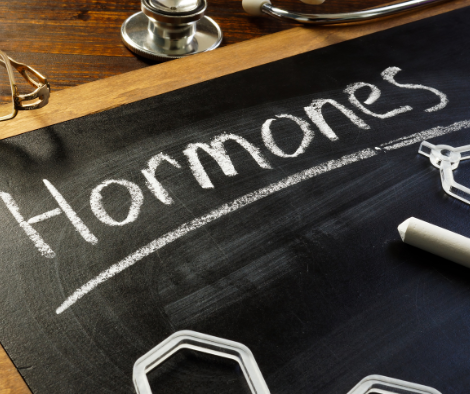Menopause—it’s a time of significant change, both physically and emotionally. While many of us brace ourselves for the infamous hot flushes, night sweats, and mood swings, what’s often less understood is the complex hormonal changes driving these symptoms. So, let’s dive a little deeper into the hormonal shifts that occur during menopause, focusing on the key players—oestrogen, progesterone, and yes, testosterone—and explore how they impact your body, and how Hormone Replacement Therapy (HRT) can help.
What Happens to Your Hormones During Menopause?
The onset of menopause brings with it a gradual but significant reduction in the levels of three primary hormones: oestrogen, progesterone, and testosterone. These hormones have been regulating everything from your reproductive cycle to your mood and energy levels for most of your life. When they start to decline, it’s no wonder the body reacts in such noticeable ways.
Oestrogen: The Star Player
Oestrogen is often the hormone that gets the most attention when we talk about menopause, and for good reason. It’s the hormone primarily responsible for developing and regulating the female reproductive system, but its role extends far beyond that. Oestrogen impacts your:
- Thermoregulation: It helps the hypothalamus regulate body temperature, which is why many women experience hot flushes and night sweats when their oestrogen levels drop.
- Bone health: Oestrogen maintains bone density, and lower levels can lead to bone thinning and an increased risk of osteoporosis.
- Heart health: It plays a role in protecting the cardiovascular system, which is why heart disease risk rises post-menopause.
- Mood: Oestrogen influences the production of serotonin, the “feel-good” chemical, which is why mood swings, anxiety, and even depression can creep in during menopause.
As oestrogen declines, these functions are affected, leading to the wide range of symptoms associated with menopause. This is where HRT can help, by supplementing oestrogen levels to ease these symptoms and protect your long-term health.
Progesterone: The Regulator
Progesterone is the other hormone closely tied to your menstrual cycle. It helps regulate your periods and prepares the uterus for pregnancy. As you approach menopause, your body produces less progesterone, which leads to irregular periods and eventually the cessation of menstruation.
Beyond its role in reproduction, progesterone also has a calming effect on the brain. As progesterone levels decline, many women experience increased anxiety, insomnia, and restlessness. This drop in progesterone, combined with fluctuating oestrogen, is often the culprit behind those sleepless nights many of us endure during menopause.
When you use HRT, progesterone is often included alongside oestrogen to balance the effects on the uterus and protect against certain risks, such as endometrial cancer, in women who still have their womb.
Testosterone: The Unsung Hero
Now, testosterone isn’t often talked about when discussing menopause, but it plays a significant role in women’s health. While testosterone is typically associated with men, women produce it too—albeit in much smaller amounts. It helps regulate libido, energy levels, and even mood stability.
As we go through menopause, our testosterone levels also drop, and this can lead to a decrease in sex drive, as well as a noticeable decline in muscle mass and energy levels. For some women, adding testosterone to their HRT regimen can make a big difference.
The benefits of testosterone therapy during menopause may include:
- Improved libido: Testosterone can help restore sexual desire, which often decreases as hormone levels shift.
- Increased energy: Some women report feeling more energised and less fatigued when testosterone is included in their HRT.
- Better mood and mental clarity: Testosterone has been shown to improve mood and cognitive function in some women, which can be especially helpful during a time of hormonal turbulence.
Testosterone therapy is generally considered for women who experience specific symptoms like low libido or fatigue that aren’t fully addressed by oestrogen and progesterone replacement alone. If this sounds familiar, it might be worth discussing testosterone with your doctor or a menopause specialist.
How Hormone Replacement Therapy (HRT) Helps
HRT can be a real game-changer for many women going through menopause. By supplementing the hormones that your body is no longer producing in sufficient quantities, HRT can help alleviate many of the more uncomfortable symptoms of menopause. The right balance of oestrogen, progesterone, and testosterone can give you back some of the vitality and well-being you may feel you’ve lost.
There are different forms of HRT available, including HRT gels, patches, and tablets. If you’re considering HRT, it’s important to talk to a healthcare professional, like a menopause doctor or private GP, to find the treatment that’s best suited to your individual needs.
Embracing the Changes
Menopause can be a tough journey, but it’s also a natural transition that marks a new phase of life. Understanding the hormonal changes that come with it can help you feel more in control, and there are effective treatments, like HRT, that can ease the process.
Remember, you don’t have to go through menopause alone. Speak to a menopause specialist if you’re struggling with symptoms and explore options like HRT to see if it can help you feel more like yourself again. After all, you deserve to live this next chapter feeling your best.

